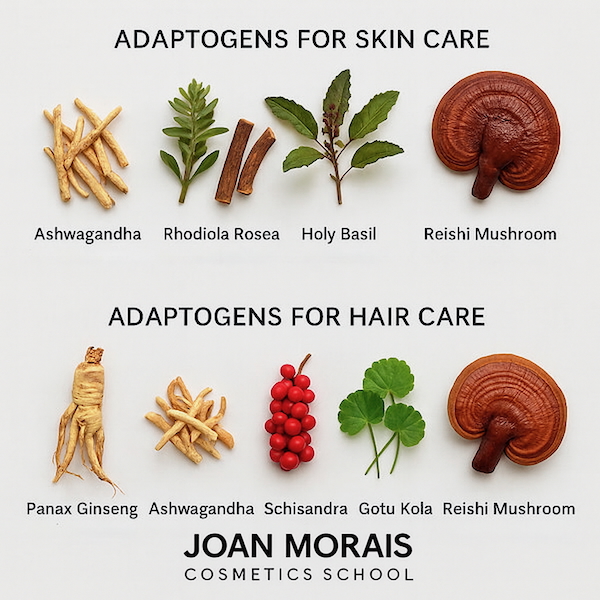Adaptogens: Nature’s Restorative Herbs for Balance, Skin, and Hair
Adaptogens are extraordinary herbs and botanicals that help the body adapt to stress, restore balance, and support overall well-being. They’ve been used for centuries in traditional medicine systems such as Ayurveda and Traditional Chinese Medicine, and today, they are gaining renewed attention in modern wellness and natural beauty.
What Are Adaptogens?
The term adaptogen refers to natural substances—usually herbs, roots, and mushrooms—that help the body resist physical, chemical, and biological stressors.
Adaptogens work by supporting the body’s ability to reach homeostasis, or balance, and adapt to changes in the environment.
To be classified as an adaptogen, a plant must:
-
Help the body resist stressors of all kinds (physical, emotional, environmental)
-
Support the body’s return to balance
-
Be non-toxic and safe for long-term use
How Adaptogens Benefit the Body
Adaptogens work on the hypothalamic-pituitary-adrenal (HPA) axis, the body’s central stress response system. By regulating stress hormones such as cortisol, they help:
-
Increase energy and stamina
-
Improve focus and clarity
-
Support immune function
-
Promote a sense of calm and resilience
When the body is balanced internally, it naturally reflects outward in radiant skin and healthy hair.
Adaptogens for Skin Health
Stress can show up on the skin as dryness, irritation, inflammation, or premature aging. Adaptogens help the skin adapt to stress by strengthening the skin barrier and improving its ability to repair and renew.
Common adaptogens used in skincare include:
-
Ashwagandha (Withania somnifera): Helps calm stressed skin, promotes a youthful glow, and supports collagen production.
-
Rhodiola Rosea: Known for energizing dull, tired skin and increasing oxygenation.
-
Licorice Root (Glycyrrhiza glabra): Brightens skin tone, soothes inflammation, and helps fade hyperpigmentation.
-
Holy Basil (Tulsi): Rich in antioxidants, it purifies the skin and supports clear, balanced complexions.
-
Reishi Mushroom: Hydrates and strengthens the skin barrier, reducing redness and signs of aging.
These adaptogens are often found in serums, facial oils, and moisturizers designed to calm, rejuvenate, and protect the skin.
Adaptogens for Hair and Scalp
The scalp is an extension of the skin, and adaptogens help maintain its health and balance. Stress and hormonal fluctuations are common causes of hair thinning or loss; adaptogens can help reduce these effects by restoring equilibrium.
Powerful adaptogens for hair care include:
-
Panax Ginseng: Stimulates scalp circulation and promotes healthy hair growth.
-
Ashwagandha: Reduces hair shedding caused by stress and strengthens hair at the root.
-
Schisandra Berry: Improves scalp vitality and enhances shine and elasticity.
-
Gotu Kola: Supports collagen synthesis and healthy hair follicles.
-
Reishi Mushroom: Reduces scalp irritation and enhances scalp resilience.
Adaptogens are used in scalp serums, strengthening hair masks, and revitalizing shampoos for their ability to support the hair and scalp from within and without.
Formulating with Adaptogens in Natural Skin and Hair Care
In natural formulation, adaptogens are often used as:
-
Extracts (glycerin, alcohol, or water-based)
-
Infused oils
-
Powders or tinctures
They can be incorporated into:
-
Moisturizers, serums, and masks for the skin
-
Hair and scalp treatments, conditioners, and elixirs
-
Balancing tonics or botanical mists
When formulating, choose high-quality extracts and sustainably sourced botanicals. Each adaptogen has a unique profile, so pairing them with complementary ingredients—such as soothing aloe vera, nourishing oils, or hydrating hyaluronic acid—enhances their benefits.
The Beauty of Balance
Adaptogens remind us that radiant skin and healthy hair begin with balance—inside and out. They bridge the gap between inner wellness and outer beauty, embodying the philosophy that when we nurture our whole selves, it naturally reflects in our skin, hair, and overall vitality.
Download Adaptogens for Skin and Hair Care Chart.
To learn more about incorporating herbs into skin and hair care formulations and creating herbal infusions, explore the dedicated module on herbs included in the Professional Natural Hair and Skin Care Courses.
You might also like


